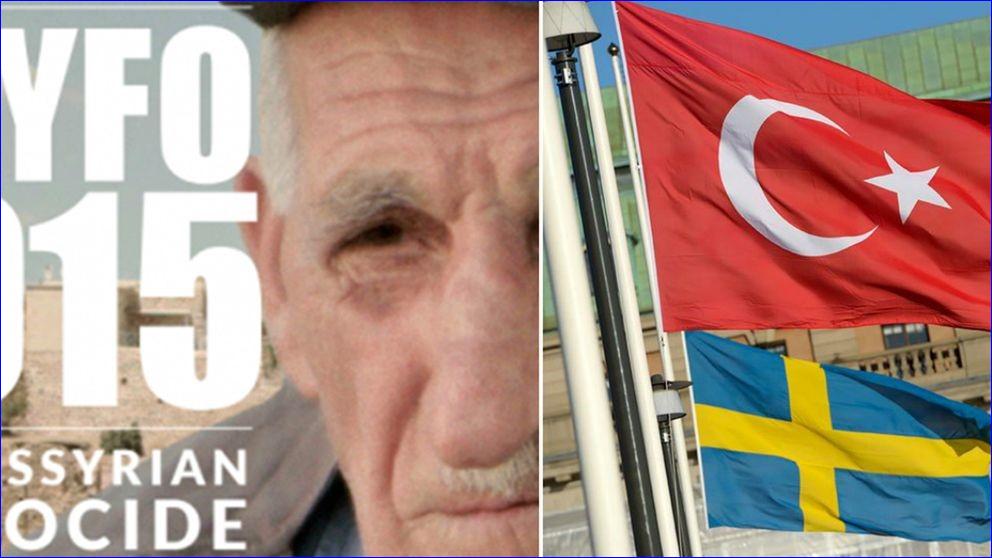
TV4 received an email note from the Turkish Embassy, signed by Arif Gulen, the press counselor of the Turkish Embassy in Stockholm. The editors of TV4 published the note on the TV4's media blog in Swedish and English.
The Embassy's press officer asks the TV4 editors to reconsider airing the documentary, because "conventional wisdom suggests that broadcasting of a documentary film comprising one-sided views of 'the 1915 events' will fail to serve the principle of objectivity of broadcasting."
The letter goes on stating that "there is no historical, academic or legal consensus on how to define 'the 1915 events'" and that "only a competent international tribunal can determine whether a particular event is genocide."
Related: Assyrian Genocide 100
The letter triggered an immediate but strong response by TV4's program director: "We can never accept this. We will protest against any attempt to exert pressure that threatens freedom of expression," commented Viveka Hansson in a written statement. "The email is polite, though the message cannot be mistaken," she added and called the letter a "a clear attempt to censor Swedish media" based on opinions not appreciated in Turkey.
The Turkish Embassy's censorship attempt was also condemned by Swedish politicians. "It is unacceptable that the country [Turkey] is seeking to silence media in Sweden and it [the government] must take a hard stance against such actions," said Jonas Sjostedt, Swedish MP from the Left Party. He even suggested that Sweden should recall its ambassador from Turkey "to make clear that what you are doing in Turkey, which is very bad for the media, you cannot do in Sweden."
The Liberal party directed an appeal to the Swedish Foreign Ministry to respond to the Turkish attempt. "It is totally unreasonable for the Turkish Embassy in Sweden trying to stop the broadcast of a documentary on a Swedish TV channel and I assume that the Foreign Ministry will now call the Turkish ambassador for a discussion on what press freedom means and what rules apply in Sweden and in the Swedish democracy,"said MP Redrik Malm, on TV4 News.
The director of the Seyfo documentary Aziz Said, who lives in Germany, said to AINA, that he is "...encouraged by the strong response of TV4's program director and the Swedish media and politicians in general in not accepting Turkish interference in free speech, and by the courageous journalism."
Seyfo (sword) is the Assyrian word for the genocide their people during the time of the World War I. The documentary depicts survivor stories along with testimonies from several European, Turkish and Assyrian historians.
Afram Yacoub, the president of the Assyrian Federation in Sweden, is not surprised about what happened. "The only way to force Turkey to face its dark history is for democratic countries like Sweden stand up for the freedom of speech and historical truth," he said. He called on the Swedish Government to follow the Parliament's 2010 recognition of the genocide. The Swedish Parliament was the first assembly in Europe to officially recognize the Assyrian, Armenian and Greek Genocide in March 12, 2010 (AINA 2010-03-11). Turkey protested the decision at the time and issued a strong condemnation in a press release from the office of the Prime Minister (Recep Tayyip Erdogan). The protest culminated in Turkey recalling its ambassador to Sweden for consultations.
Sweden's genocide recognition explicitly referred to Assyrians and Pontic Greeks victims. Their suffering during the World War I has been mostly forgotten for decades, but in December 2007 the International Association of Genocide Scholars (IAGS) did vote overwhelmingly to recognize the genocides of the Assyrian and Greek populations of the Ottoman Empire between 1914 and 1923. For the Assyrians in Sweden, the recognition of the genocide was a milestone in their effort for political acknowledgment.
Eleven countries and institutions have recognized the Assyrian genocide.
The documentary Seyfo 1915 -- The Assyrian Genocide was aired as scheduled; however this incident is another chapter in Turkey's recent attempts to ban freedom of speech and silence journalism outside its own borders. The second part of the documentary is scheduled to be aired on TV4 on Sunday, May 1st.






































No comments:
Post a Comment